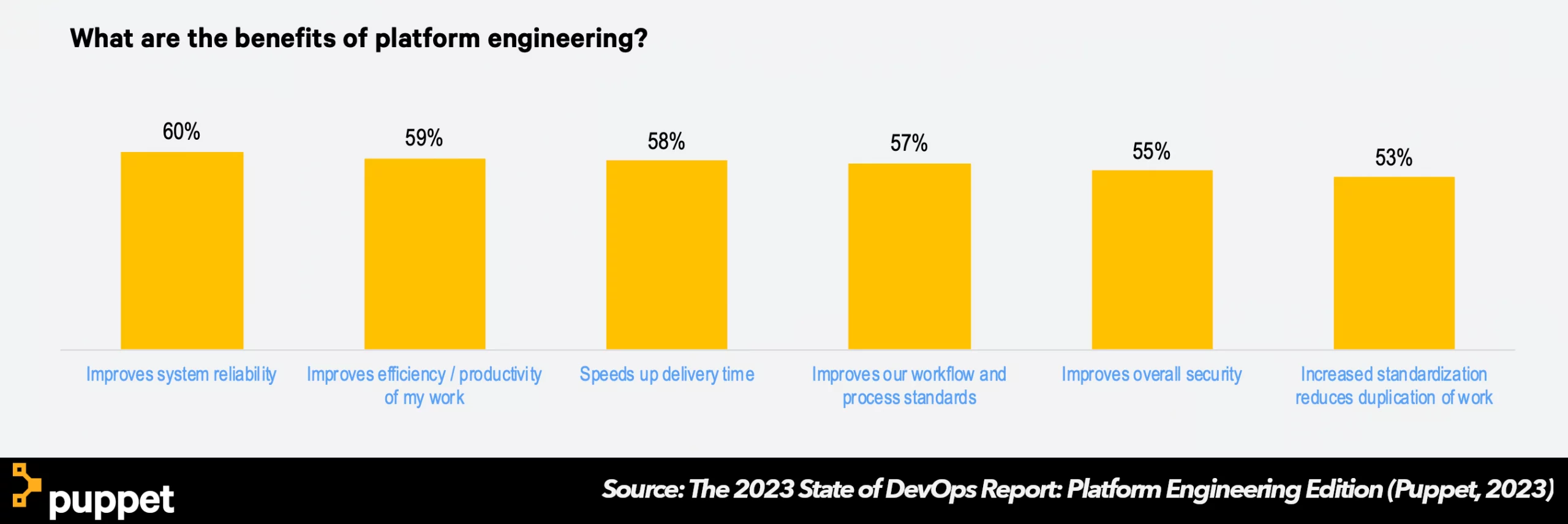Hey there fellow DevOps engineers. Have you been doing this DevOps thing for a few years now? Got those CI/CD pipelines humming, moved everything to containers, went all-in on the cloud. But lately you might be feeling a little restless. The glamor of working at a hot startup has worn off and the cutting edge tech you mastered feels old hat?
I feel you. We all hit those ruts in our careers eventually. The good news is, there’s an emerging field of platform engineering that just might reignite your passion for development.
The team at Talent500 found an increasing trend towards hiring DevOps engineers with Platform Engineering skills and thus, we decided to create a stellar article to guide our readers.
In this post, I’ll break down what platform engineering is, the key differences from DevOps, who it’s best suited for, and how making the switch could level up your skills and career satisfaction.
Let’s dive in!
The Emergence of Platform Engineering
First, what exactly is platform engineering? I like to think of it as mini DevOps. The core goals of speeding up software delivery and improving quality remain the same. But the way we achieve them has evolved.
Platform engineering focuses on creating tailored internal platforms that abstract away infrastructure complexities. The platform team handles the undifferentiated heavy lifting of tooling management and operations. This frees up developers to concentrate on writing stellar code vs getting bogged down in tooling minutiae.
So in essence, platform engineering takes proven DevOps approaches like infrastructure-as-code and bundles them into self-service platforms for developers. The end goal is enhancing developer productivity by removing roadblocks.
The Need for Abstraction
“Why not just improve our DevOps processes?” you might ask. It’s a fair question. The issue is that software keeps getting more complex. The expanding array of languages, frameworks, containers, clouds and tools to master can overload even the most skilled DevOps pros. We’re juggling more responsibilities than ever before.
The platform engineering approach says: let’s lift some of that burden through better abstraction. Rather than having each team select and manage their own tools, the platform squad handles it for everyone.
They own, integrate, automate and maintain the tools so developers don’t have to become experts. Platform teams aim to understand developers’ needs and then provide those capabilities through the platform. This simplifies workflows for users while optimizing for reliability and security behind the scenes.
Aligning Platforms to Developer Journeys
Now this is where the art comes in. Good platform engineering isn’t about imposing one centralized set of tools. The team still needs to collaborate closely with developers and iterate the platforms based on evolving needs.
For example, data scientists likely need access to notebooks and big data tools. Front-end devs care more about web application scaffolds. Backend devs want containerization and API gateways. The platform should align to these personas and their workflows.
Done right, it enhances the developer experience by removing distractions. Developers gain more autonomy to focus on coding vs infrastructure. The platform empowers their work rather than restricting it.
But achieving this nirvana requires platform engineers to continually engage with users. The platforms must evolve as workflows and technologies change. This close collaboration helps ensure the abstractions match real needs.
The Benefits of Platformification
Okay, the concept makes sense on paper. But what are the real benefits? Here are some of the key upsides organizations see after adopting platform engineering:
- Improved developer productivity and satisfaction – By removing tooling distractions, developers can spend more time creating business value vs configuring infrastructure. They gain more autonomy and control.
- Higher release velocity – With standardized deployment workflows, teams can release changes faster. Less configuration work speeds up delivery.

(Credits: Puppet)
- Enhanced reliability and security – Concentrating tooling expertise into hardened platforms boosts stability and security. Economies of scale help.
- Better governance – Central platforms reduce shadow IT and make it easier to enforce policies. Less tool sprawl aids governance.
- Operational efficiencies – Consolidating maintenance of the platform toolchain reduces overhead for Ops teams. Less tool variation streamlines work.
- Better cross-team collaboration – Shared abstractions enable teams to use common languages and roadmaps. This fosters better alignment.
As with most things, there are also tradeoffs to weigh. Platforms can inhibit flexibility when taken too far. Over standardization risks frustrating advanced users. The idea is similar to any internal platform – strike the right balance between consistency and customization.
Should You Make the Leap?
So that covers the what and why of platform engineering. But should you transition from DevOps to this emerging field? Here are a few key considerations:
- You’re passionate about great developer experiences – Platform engineers need to deeply empathize with developers to build great self-service solutions. If you geek out on optimizing workflows for productivity, it may be a fit.
- You’re a strong collaborator – Close cross-functional collaboration is critical. You’ll partner with developers, architects, ops teams and business stakeholders. Communication and teamwork skills are vital.
- You enjoy creating leverage – Platforms are force multipliers that enable teams to scale. If making an impact beyond individual projects motivates you, this could be your chance.
- You’ve mastered DevOps fundamentals – You’ll need a solid grasp of infra-as-code, CI/CD, containers and modern ops to be effective. Deep hands-on experience is a prerequisite.
- You’re passionate about internal tooling – Getting excited about issues like release management and developer monitoring tools is important. These components make up the nuts and bolts of platforms.
- You think longer-term – Look beyond individual projects to how you can create lasting leverage across programs. Take a multi-product view vs a single team scope.
Making the Leap
If this sounds like your dream job, how can you transition into platform engineering? Here are some tips:
- Start automating and improving internal tooling in your current role – Look for opportunities to bundle tools into more cohesive services.
- Attend meetups and conferences on developer experience and platform engineering – Network with and learn from others doing this work.
- Read industry content on the field – Sites like O’Reilly and DevOps Institute offer good coverage on platform engineering.
- Shadow and pair with platform engineers in your company – See if you can collaborate on projects to get hands-on experience.
- Update your resume and LinkedIn to highlight relevant experience – Showcase work improving developer productivity and tooling management.
- Watch for dedicated platform engineering openings – Leading companies are hiring for these roles as the field grows.
Closing Thoughts
If you made it this far, hopefully you’ve got a solid handle on the emerging world of platform engineering now. It takes the best parts of DevOps – automation, collaboration and developer empowerment in one power packed profile.
For mid-career DevOps engineers looking for that next challenge, it’s an exciting specialization to consider. You have the right base skills and experience to thrive. And it leverages your knack for eliminating distractions so developers can build innovations.
If anything I’ve said resonates, I encourage you to pursue it. Your skills are in high demand. Make the leap, and help pave the way for the next generation of DevOps. The future’s bright for those looking to level up!
Want to grab a similar opportunity? Join Talent500 now!






Add comment